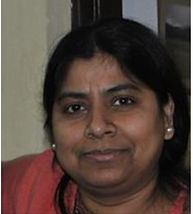Dr Kanchan Phadwal
Email - kanchan.phadwal@roslin.ed.ac.uk
https://orcid.org/0000-0001-6745-9818
https://pubmed.ncbi.nlm.nih.gov/?term=Phadwal&sort=date
.jpg)
Research interests:
I am currently a full-time BBSRC funded postdoctoral scientist in the Macqueen group. My research over the last twelve years has focused on mechanisms involved in maintaining cellular homeostasis during ageing and under different health contexts. My research is focused on the cellular recycling pathway autophagy, which is heavily implicated in ageing, longevity and metabolic diseases. In the last two years, in an effort to carve out an independent research niche, I started to investigate the role of autophagy in farmed Atlantic salmon health. I am investigating how the current diet enriched with vegetable oils influence autophagy-based recycling of lipids in salmon muscle and adipose tissue and its intrinsic and extrinsic connection with salmon’s immune robustness.
Biography and previous work
After my Ph.D. in microbiology at the Indian Institute of agricultural research New Delhi, I started my autophagy research career at the University of Oxford with Prof Katja Simon as a core facility lab manager and a postdoctoral scientist, where I developed a novel assay to detect, autophagy in blood cells using a state-of-the-art imaging flow cytometer. Measuring autophagy in blood until this point was challenging, because of the low volumes of blood collected from patients. Using this assay, I could demonstrate that autophagy declines with age in T cells.
After moving onto different labs, my work as a postdoctoral scientist was firstly with Prof Jean Manson, my work here revealed autophagy as a mechanism in degrading prion particles in brain cells and then with Dr Vicky MacRae. Here, I identified autophagy as a novel mechanism supressing osteogenesis in vascular smooth muscle cells via p62 mediated degradation of RUNX2, a key osteogenic transcription factor. Continuing in Dr MacRae’s lab, I have identified a selective form of autophagy, which removes damaged mitochondria (mitophagy) in a p53-regulated mechanism that underpins vascular calcification This has demonstrated for the first time that mitochondria undergo an acute change in morphology and function during vascular calcification.
Key publications
1. Metformin ameliorates valve interstitial cell calcification by promoting autophagic flux. Phadwal K, Tan X, Koo E, Zhu D, MacRae VE. Sci Rep. 2023 Dec 5;13(1):21435. doi: 10.1038/s41598-023-47774-6.
2. p53 Regulates Mitochondrial Dynamics in Vascular Smooth Muscle Cell Calcification. Phadwal K, Tang QY, Luijten I, Zhao JF, Corcoran B, Semple RK, Ganley IG, MacRae VE. Int J Mol Sci. 2023 Jan 13;24(2):1643. doi: 10.3390/ijms24021643.
3. Metformin protects against vascular calcification through the selective degradation of Runx2 by the p62 autophagy receptor. Phadwal K, Koo E, Jones RA, Forsythe RO, Tang K, Tang Q, Corcoran BM, Caporali A, MacRae VE. J Cell Physiol. 2022 Nov;237(11):4303-4316. doi: 10.1002/jcp.30887.
4. Spermine increases acetylation of tubulins and facilitates autophagic degradation of prion aggregates. Phadwal K, Kurian D, Salamat MKF, MacRae VE, Diack AB, Manson JC. Sci Rep. 2018 Jul 3;8(1):10004. doi: 10.1038/s41598-018-28296-y.
5. Analyzing the Colocalization of MAP1LC3 and Lysosomal Markers in Primary Cells. Phadwal K. Cold Spring Harb Protoc. 2015 Sep 1;2015(9):pdb.prot086272. doi: 10.1101/pdb.prot086272.
6. A novel method for autophagy detection in primary cells: impaired levels of macroautophagy in immunosenescent T cells. Phadwal K, Alegre-Abarrategui J, Watson AS, Pike L, Anbalagan S, Hammond EM, Wade-Martins R, McMichael A, Klenerman P, Simon AK. Autophagy. 2012 Apr;8(4):677-89. doi: 10.4161/auto.18935.
Awards and key grants
2021: Bone Research Society selected my work on mechanisms of autophagy in vascular calcifciation diseases for a new investigator award.
2023-2024: UK Sea Food Innovation Fund- ‘Enhancing lipophagy, a novel lipid catabolic pathway, for healthy and sustainable Atlantic salmon aquaculture’. PI (£151,032.69 + £10,500 in kind of funding from MOWI and SAIC, includes £5,000 cash). 18 months
2022-2023: Roslin Institute Strategic Program Early Career Researcher grant - ‘Lipophagy enhances free fatty acid mobilisation to mitochondria – Key to healthy Atlantic salmon farming’. PI (£2,470).
2022-2024: British Heart Foundation Centre for Research Excellence REA3– ‘Illuminating the role of mitochondria during arterial calcification’. Co-Investigator (£92,949).
5. 2022: BBSRCs Flexible Talent Mobility Award (Travel to MERL, Machrihanish for collection of Salmon samples) PI. (£1,040).
2021-2023: Roslin Institute Strategic Program grant - ‘Developing new genetic tools to study mitochondria and metabolism in poultry’. Co-investigator (£29,549).
2021-2023: Roslin Institute Strategic Program grant ECR ‘Lipidome modelling to understand lipophagy and improve health in Atlantic salmon’. PI (£2,950).
2020-2022: Early Career Researcher Development Fund, SULSA ‘Selective clearance of lipid droplets by lipophagy reduces inflammation and mortality in farmed Atlantic salmon’. PI (£4,000).
Internal and external roles
Formally recognised co-supervisor for two PhD students (2021-2025).
Led and coordinated the team for a special issue on ‘Mitochondrial Dysfunction in Metabolic Diseases’ published in Frontiers in Cell and Developmental Biology (2021-2022).
Grant review panel member, Western Australian Cardiovascular Research Alliance (WACRA) in 2021.
Peer reviewer for different journals e.g., Clinical and Translational Medicine, FASEB Journal, Molecular Neurobiology, DNA and Cell Biology, Cell death discovery and Nature communications.